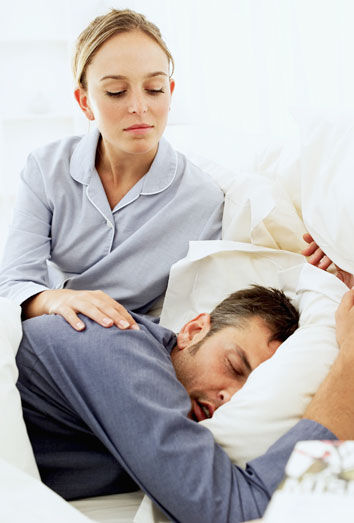Many people recount a most distressing moment just as they are falling asleep or just waking up where they cannot move. It is about sleep paralysis and it is a sleep disorder that, although it is very disturbing, does not have any danger to health. There is no shortage of those who attribute this unique phenomenon to the presence of spirits, demonic possession or astral travel, but nothing is further from the truth.
What is sleep paralysis
- Between 50 and 60% of the population has experienced this phenomenon at some point. It happens when you are falling asleep or when you have just woken up, that you can hear and see what is around you (without ruling out that hallucinations sometimes occur) but you cannot move. You can’t move your arms, legs, or neck, you can’t even talk… You’re paralyzed.
- The feeling is most distressing, as if you were dead but conscious. Also, frequently, you have the feeling of floating, seeing yourself from the outside or with the impression that the mattress is sinking. It’s like a nightmare, even though you don’t really know if you’re asleep or awake. And it is certainly one of the most terrifying experiences.
The (approximate) duration of sleep paralysis
- But we insist that sleep paralysis does not have any health risk. It is a lack of synchronization between REM sleep and muscle relaxation. When we enter REM sleep, our brain is still active, but our muscles are completely relaxed. When you suffer from sleep paralysis, this synchronization fails, we wake up prematurely when the body is still relaxed and unable to move.
- This phenomenon falls within sleep disorders or parasomnias, among which are also sleepwalking and night terrors. But there is nothing to worry about, because it subsides in a few seconds or at most it lasts a couple of minutes, what happens is that the person who is suffering from it perceives those seconds as eternal.
- Nor do you have to do anything special for the paralysis to pass. The body is in charge of mobilizing its usual functions again when it realizes that it is awake and that it has left REM sleep prematurely. So there is nothing to worry about and it is not necessary to give this event a paranormal character.
What are the causes of sleep paralysis
- And why does sleep paralysis occur? This parasomnia has different causes that must be sought in the event that the paralysis occurs frequently and not in isolation. There is nothing to worry about if it happens to you once. If it happens several nights in a row, you’d better see your GP.
- Because sleep paralysis can be a symptom of a disease like narcolepsy. It is true that narcolepsy is not a frequent disease, but it must be treated as soon as possible because the quality of life of the person who suffers from it considerably decreases.
- The genetic factor for episodes of sleep paralysis is not ruled out, so you will have to check your family history if there are more people who suffer from this disorder.
- But most of the time, sleep paralysis responds to a specific circumstance of sleep deprivation or disturbance. The famous jetlag when you travel frequently and change schedules abruptly is one of those circumstances, but also spending the whole night finishing the project or studying can lead to one of these distressing episodes the next night.
- Special attention should be given to people who work at night or with shifts for long hours in which they have to stay awake for a long time because they are also among the group of people who suffer the most sleep disorders.
- Among the causes, Francisco Rapallo Roes’ Final Degree Project on sleep paralysis for the University of the Republic (Uruguay) also mentions “sleeping in a supine position, increased anxiety (especially social anxiety), excessive use of stimulants, physical fatigue, and significant life changes…”
- Depending on the cause of the sleep paralysis, one treatment or another will be recommended, although the key is always rest and regular schedules to prevent this parasomnia from leading to an insomnia problem. We already know how insomnia destroys physical and mental health if it lasts over time, so you have to act at the first signs.
How to avoid sleep paralysis
- The question we all ask ourselves is whether sleep paralysis can really be prevented. The answer is negative, but what we can do is minimize its effects and prevent it from becoming an insomnia problem.
- For this and as we always recommend whether or not sleep disorders are involved, it is important to maintain scrupulous sleep hygiene. And we understand that these measures to achieve a restful sleep are not always possible since they include avoiding or reducing the level of stress and maintaining a regular sleep schedule, so depending on what your job is, it may be impossible for you.
- If you work under a lot of pressure, stress is inevitable. And if you work shifts, sticking to a regular sleep schedule won’t be within your reach. But there are other things that you can do, such as prioritizing rest, avoiding medications that affect sleep, sleeping the hours your body needs, and avoiding exciting drinks before going to bed.
- Of course, having healthy lifestyle habits also influences night rest. A varied and balanced diet helps to sleep better, as does sports. But be careful with the practice of sport, because for it to positively influence sleep, it must be done at least three hours before going to sleep.
Is sleep paralysis dangerous to health?
- One of the most important aspects to highlight about sleep paralysis is that it is NOT dangerous to health beyond the fact that it leads to insomnia. But we cannot ignore the terror that is felt and the sensations so terrible that they can have consequences on an emotional level.
- The most common idea is that at the moment the paralysis occurs you are having a stroke and it is of little use that you have already experienced it some other time because you will think the same thing again. And another of the recurring ideas is that you are going crazy, especially if the paralysis is accompanied by hallucinations.
- You are not going to die, nor are you going to go crazy, but that is what you think every time you suffer, for example, a panic attack. And having those thoughts is inevitable. Do not try to maintain control of the situation because you cannot, by now you know that the paralysis will subside on its own in a few seconds and that in no case will it paralyze muscle tissue necessary for vital functions.







